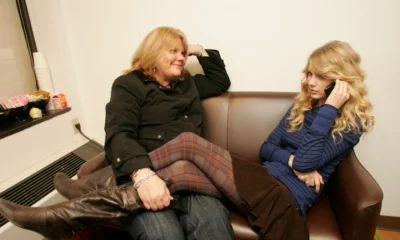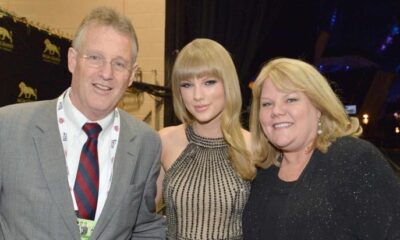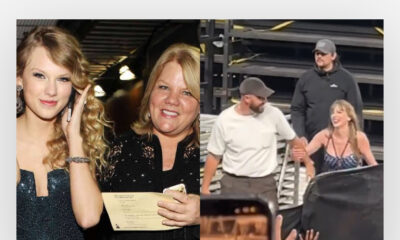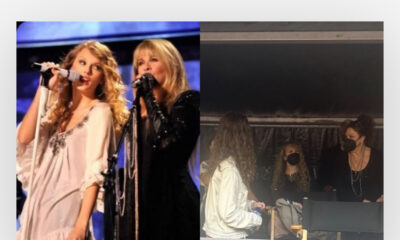NEWS
Taylor Swift makes shocking revelation after seeing unflattering photos or negative comments about her looks 😔

Taylor Swift has opened up about her eating disorder that was triggered by unflattering photos or comments about her appearance.
The singer, 30, has admitted she used to ‘just stop eating’ if she saw a photo of herself where she felt she looked too big or if someone made a cruel comment about her size.
Speaking in her Netflix documentary Miss Americana, she said: ‘It’s not good for me to see pictures of myself every day.
‘It’s only happened a few times, and I’m not in any way proud of it. [There have been times when I’ve seen] a picture of me where I feel like I looked like my tummy was too big, or… someone said that I looked pregnant … and that’ll just trigger me to just starve a little bit – just stop eating.’
Taylor Swift has opened up in her new Netflix documentary about her eating disorder that was triggered by unflattering photos or comments about her appearance
+
8
View gallery
Taylor Swift has opened up in her new Netflix documentary about her eating disorder that was triggered by unflattering photos or comments about her appearance
The singer, 30, has admitted she used to ‘just stop eating’ if she saw a photo of herself where she felt she looked too big or if someone made a cruel comment about her size
+
8
View gallery
The singer, 30, has admitted she used to ‘just stop eating’ if she saw a photo of herself where she felt she looked too big or if someone made a cruel comment about her size
‘If you think the moon landing was staged, just wait ’til you see Miss Americana’: Critics pan Taylor’s doc
Critics have slammed Taylor Swift’s Miss Americana documentary for being too staged and calculated:
New York Post: If you think the moon landing was staged, just wait ’til you see ‘Miss Americana’.
Most of the film, which premiered Thursday night at the Sundance Film Festival and hits Netflix on Jan. 31, is more wooden than Pinnochio.
Vanity Fair: Something cynical crept into my head while watching
It was an apprehension about just how managed this whole thing is, how precise it is in its mythology.
Miss Americana sometimes feels like a snow job, like we are being hoodwinked into buying an idea with nothing to balance it against.
Slate: The objection to Miss Americana, will be that this is just Swift’s latest, and perhaps canniest, calculation
The Guardian: Here is a character study authored by the character who’s being studied, a carefully controlled continuation of a story we have been following now for years.
It’s brand management dressed up as insight and while it’s not entertaining, it’s certainly far from particularly revealing, playing more like a PR exercise than a festival-worthy feature.
ADVERTISEMENT
Polygon: Like much of Swift’s music (it) is confessional, but rarely raw. Even when she’s chowing on a burrito and batting melodies around with her collaborators, she’s performing for camera, delivering dialogue on the heightened wavelength of something like
In the documentary, then-and-now photos show how thin the Me! singer was during her 1989 album era contrasted with the slim but healthier look she presented while touring Reputation in 2018.
Taylor admitted she regularly felt like she was ‘going to pass out’ while on stage at her thinnest because of her under eating.
She said: ‘I thought that I was supposed to feel like I was going to pass out at the end of a show, or in the middle of it. Now I realise, no, if you eat food, have energy, get stronger, you can do all these shows and not feel (enervated).’
And the Look What You Made Me Do hitmaker was always ready to defend concerned comments about her diet.
She admitted her response to concern was: ‘”What are you talking about? Of course I eat. …. I exercise a lot.” And I did exercise a lot. But I wasn’t eating.’
These days, Taylor doesn’t care as much if someone comments on her weight gain and has accepted ‘the fact that I’m a size 6 [UK size 10] instead of a size double-zero.’
Swift admitted her relationship with food was centred around a cycle of ‘praise and punishment’.
She told elaborated on her comments in the dcocumentary in an interview with Variety.
She said: ‘My relationship with food was exactly the same psychology that I applied to everything else in my life: If I was given a pat on the head, I registered that as good. If I was given a punishment, I registered that as bad.

























